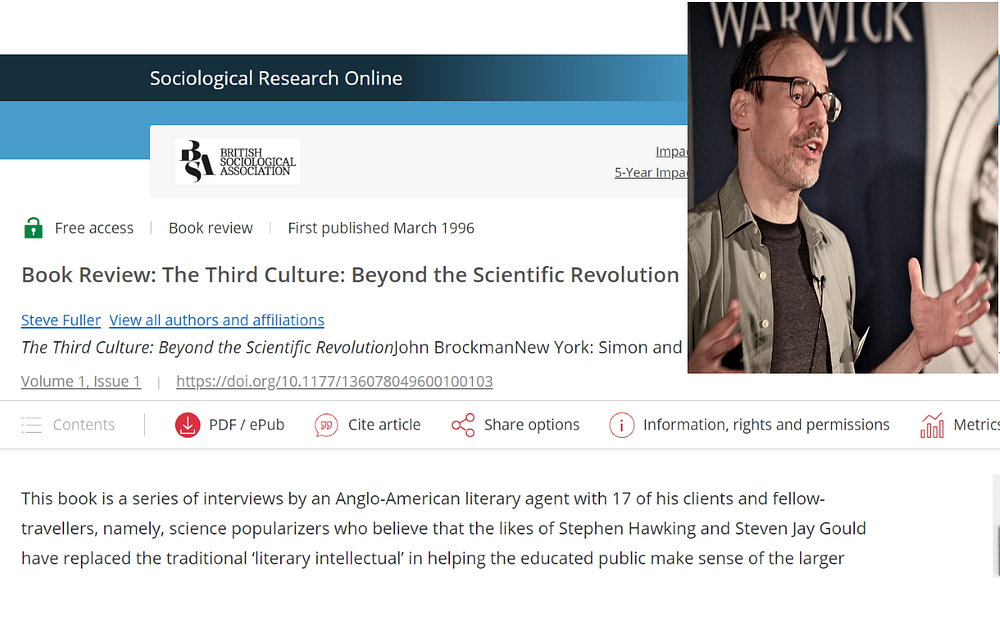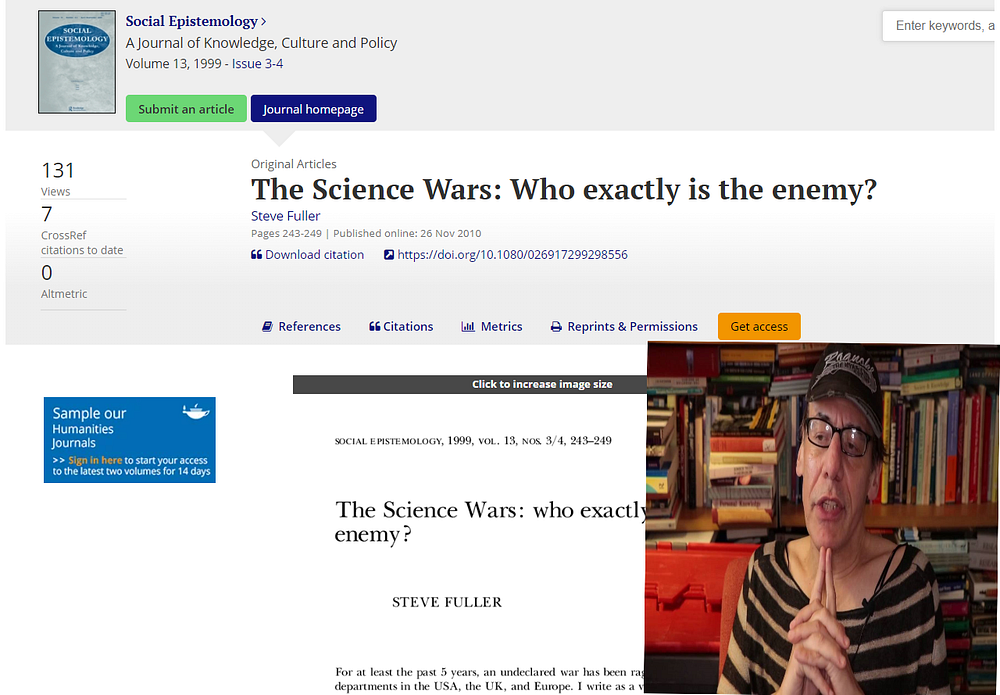Professor Fuller believes that his fellow sociologists (perhaps simply himself) could “solve, or at least “dissipate” the “deep puzzles” of physics and biology. He also wrote that some biologists have only “interdisciplinary pretentions” and that the evolutionary biologist “[Stephen] Gould wants to flaunt his well-roundedness”. Finally, Fuller believes that A.C. Grayling’s “grasp of the history of science [doesn’t go] beyond head-banging standards”.

“It seems to me that much of the comment on science by the social constructivists and postmodernists is motivated by the desire to enhance the status of the commentator — that he be seen not as a hanger-on or adjunct to science, but as an independent investigator, and perhaps as a superior investigator, by reason of his greater detachment.”
— Theoretical physicist Steven Weinberg (1933–2021), in his book Facing Up: Science and Its Cultural Adversaries. (See source here.)
[Professor Fuller is mentioned in Steven Weinberg’s book. Weinberg commented on Fuller’s defence of the journal Social Text, which published the “Sokal hoax”. Apparently, Fuller believes that Alan Sokal “abused the trust of the editors of Social Text”.]
Introduction
The first two essays of this series concentrated on scientists criticising (sometime insulting) other scientists and other scientific disciplines. Now let’s move away from those scientists quoted in John Brockman’s The Third Culture: Beyond the Scientific Revolution to a sociologist commenting on that book itself.
In this case, then, we have a sociologist attempting to trump both other sciences and other scientists.
[See my first two essays: ‘Scientists at War With Scientists: Insults, Politics, and Darwinism’ and ‘Science is Red in Tooth and Claw: Biologists vs Physicists vs Biologists’.]
Professor Fuller Challenges Some Would-Be Emperors

In ‘Book Review: The Third Culture: Beyond the Scientific Revolution’, Professor Steve Fuller (1959-) laid his cards on the table when he told us that his prime motive was to
“challenge these skimpily clad would-be emperors”.
Of course Fuller wasn’t entirely critical of Brockman’s book or the scientists included in it. After all, Fuller’s main (or only) gripe is that the social sciences (or his own sociology) aren’t included in it. That said, in Brockman’s later books, many social scientists have indeed been featured — see (here and here). But, alas, not Professor Fuller himself. (Perhaps Brockman read Fuller’s critical review.)
In any case, Steve Fuller went on to state the following:
“[T]o a sociologist, it will be apparent that many of the ‘deep puzzles’ that these scientists brood over could be solved, or at least dissipated, by a dose of social science [].”
That’s an incredibly highfalutin claim.
That said, Fuller moves away from the obvious rhetoric when he also said that sociologists must
“assess critically their [i.e., natural scientists’] proposals and not be afraid to reveal gaps in their knowledge”.
He then went on to argue that
“much of what is said could have benefited from the presence of a sociological interlocutor”.
Isn’t all this simply an embarrassing display of outrage from someone who’s so immersed in his own subject (i.e., sociology) that he can’t see the wood for the trees? That said, it can of course be supposed that Professor Fuller will probably believe that the social sciences (or his own sociology) would enable both physicists and biologists to see the wood, rather than the trees.
Yet surely this simple embrace of social science (or Fuller’s own sociology) is hardly likely to solve these deep puzzles… That’s if Fuller believes that there are any deep puzzles at all in physics and biology.
The words “Fuller’s own sociology” (Fuller has also used the term “collective epistemology”) were put in parentheses a few moments ago. That’s because although Fuller used the words “social science” once or twice, he refers to “sociology” more often. For example, Fuller told his readers that
“[w]hen Penrose sketches a unified theory of everything, he sees roles for physicists, psychologists, computer scientists and maybe even theologians — but not sociologists”.
Fuller also puts the words “deep puzzles” in scare quotes, which strongly suggests that he doesn’t actually believe that they are deep puzzles. More precisely, Fuller believes that if physicists and biologists injected themselves with a strong dose of social science (or Fuller’s own sociology), then these deep puzzles would simply (to change the tenses of his own words) dissolve or dissipate. (I suppose that this would make Professor Fuller the Wittgenstein of Sociology.)
Fuller continued:
“[T]he most disturbing feature of these interviews is that despite their interdisciplinary pretensions, none of the scientists ever feels the need to refer to theories or findings of the social sciences (except for a few derogatory remarks about economists). When Gould wants to flaunt his well-roundedness, he quotes Horace and Shakespeare, not Marx and Weber [].”
This just sounds like a sociologist attempting to enlarge his own academic (or career) fiefdom.
Indeed, perhaps Fuller gave his political and career-minded game away when he used these (seemingly) envious words:
“[T]he most highly subsidized areas of the natural sciences (high-energy physics, cosmology, evolutionary theory, artificial intelligence).”
This (what seems like) enviousness displays itself again when Fuller wrote the following:
“Whenever a non-fiction best- seller is written by an academic, it tends to be by a natural scientist, not a humanist or social scientist.”
Fuller’s problem above may have something to do with the prose styles of certain academics who’re also sociologists. That is, much stuff that’s written by sociologists (i.e., those indebted to Michael Foucault, poststructuralism, postmodernism, etc.) is arcane and sometimes outrightly pretentious. Such sociologists also don’t want to transcend their tribal academese because, if they did, then the paucity of their ideas would be clearly displayed to all those on the outside.
All that said, what about the (relative) “best-sellers” of such people (not all sociologists) as Karl Marx, Herbert Marcuse, Jean-Paul Sartre, Zygmunt Bauman, Slavoj Žižek, Michel Foucault, Judith Butler, Jurgen Habermas, Jean Baudrillard, Jacques Derrida, Pierre Bourdieu, Alain Badiou, etc?

What’s more, Professor Fuller himself has been successful when it comes to selling his many (i.e., 21) books. He has also given more than 100 media interviews and his works have been translated into fifteen languages. In addition to all that, 23 academic symposia have been published on his work…
But, clearly, Fuller wants more.
That said, Fuller is still not, of course, a best-seller in the Stephen Hawking or Jackie Collins sense. But he’s still an (as it were) academic best-seller…
In any case, perhaps there are many reasons as to why the scientists Fuller targeted didn’t embrace (or even refer to) the social sciences. Perhaps one such reason is that much social science (especially sociology) is devoted to advancing certain political and social goals — and surely that must get in the way of the science part of social science. And there may be many other reasons why Brockman’s (natural) scientists ignored sociology too, but none of them are mentioned by Professor Fuller. (As stated in the introduction, social scientists are extensively featured in Brockman’s later books.)
And let’s say that even if one of the scientists in The Third Culture did state (as Fuller says) “derogatory remarks about economists”, then does that also mean that all the scientists in that book believed exactly the same thing? (I actually recall some positive remarks about economics and other social sciences in the very same book.)
So the fact that such scientists didn’t mention Fuller’s examples of “Marx and Weber” may simply show us that Fuller himself can’t get over the fact that his targeted scientists simply don’t have the same interests, theories and (often political) concerns which he does. Indeed Fuller’s mention of Marx may also show us (as already mentioned) that the politics in social science (or, usually, sociology) can be much stronger than the science in social science…
So it’s worth saying here that Fuller himself is both honest and explicit about the political nature of all his work — even his epistemology. (He captures this by stressing the difference between “collectivism” and “individualism” in philosophy — specifically epistemology - and the sciences. See here.) …
Consequently, all this will almost certainly mean that Fuller would reject my (no doubt “naïve”) science-politics “binary opposition”.
So, again, all the above may be one reason as to why the scientists featured in The Third Culture kept away from Fuller’s own discipline — sociology.
Steve Fuller then went into more detail when he wrote the following:
“Clearly, Gell-Mann is not familiar with the ‘path-dependent’ accounts of technological development that sociologists and economists have set out over the years. Brockman has unwittingly given us a wake-up call to challenge these skimpily clad would-be emperors.”
Again, Fuller was simply displaying his highly-specific interests and biases when he mentioned “‘path-dependent’ accounts of technological development”. And, lo and behold, Fuller just happens to have written on this subject himself (see here)!
Moreover, Fuller even concedes that theoretical physicist Murray Gell-Man did acknowledge history when he wrote the following:
“Murray Gell-Mann observes that it ‘finally’ draws attention to the fact that history is determined by ‘frozen accidents’, such as the fact that Henry VIII, rather than his brother, ascended to the English throne.”
But that wasn’t enough for Professor Fuller!
Fuller effectively wanted Murray Gell-Mann to be as emersed in sociology (or the social sciences generally) as he is. But, of course, if that had been the case, then Gell-Mann would have actually become a sociologist.
Personally, I know a little about path dependence in physics. However, I confess to knowing nothing about path-dependent accounts of technological development. So that must mean that I’m precisely the kind of person Fuller castigates.
What’s more, Fuller might well have mentioned innumerable other theories which his targeted scientists didn’t mention — or which they don’t know anything about. So surely this must mean that Fuller mentioned a very-specific area (or “account”) which he does know about (i.e., path-dependent accounts of technological development). And then he went on to simply assume ignorance on the part of his targeted scientists for not knowing — or simply mentioning — it.
All that said, there will be many other (relevant) things which these scientists know, and which Fuller himself doesn’t know. So should such scientists now arbitrarily namedrop the theories and ideas which Fuller himself doesn’t know?
Professor Steve Fuller can also be quoted picking up on my first essay’s scientists-at-war-with-scientists theme (see ‘Scientists at War With Scientists: Insults, Politics, and Darwinism’) when commenting on Brockman’s The Third Culture. He wrote:
“[] Darwin’s defenders seem keen on accusing each other of theological proclivities. For example, Gould attacks Dawkins’s belief in the adaptive quality of all organic traits as being a secular version of creationism, whereas Dennett diagnoses Gould’s belief in the limited explanatory powers of natural selection as a latent desire to hold something more exalted than blind natural forces responsible for things as they are.”
The problem here is that Fuller got involved with this war himself when he uses such phrases as “these skimpily clad would-be emperors”, “[Stephen] Gould wants to flaunt his well-roundedness”, “despite their interdisciplinary pretensions”, etc.
So it’s worth saying here that Fuller has also aimed his criticisms and insults at philosophers — as well as others — too.
Take his little spat with the British philosopher and author A.C. Grayling (1949-).
Steve Fuller says (in his article ‘Against the Faith’, which was published by New Humanist) that Grayling’s “grasp of the history of science [didn’t go] beyond head-banging standards”. (That’s not very humanist, is it?) And then Grayling got all macho himself (in his sarcastically titled article ‘Origin of the Specious’) when he retorted:
“I’ll take on Fuller any day regarding the history and theology of the various versions of Christianity with which humanity has been burdened. […] The same applies to the history of science.”
Perhaps all this is more a case of academics — rather than scientists — being at each other’s throats, vying for various academic and career fiefdoms, and crudely displaying their (manly) egos.












No comments:
Post a Comment